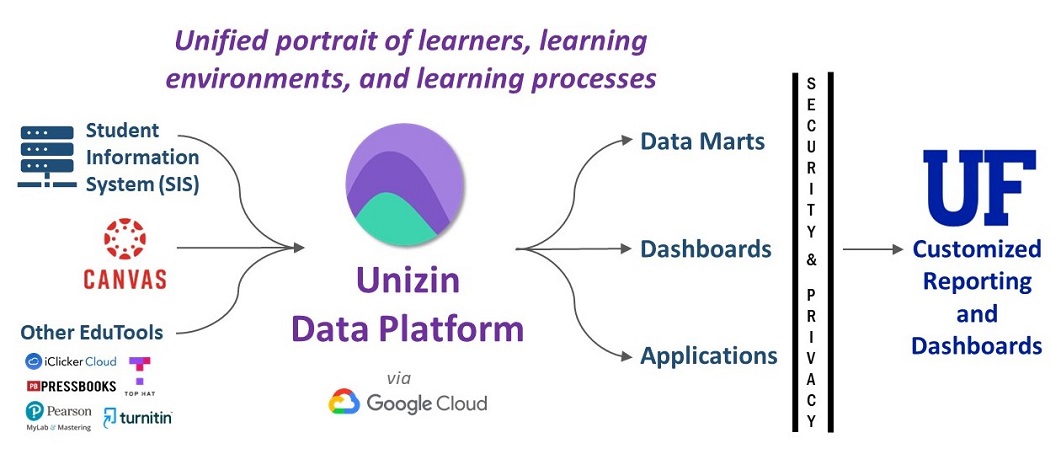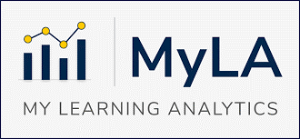Unizin’s Data Platform (UDP) collates data from its member institutions and makes this cloud-native data available for educational research applications. Utilizing UDP data provides access to the world’s first unified institutional-level data platform that aggregates, cleans, models and stores all teaching and learning data, from multiple learning sources as well as the Student Information System (see figure below). Bringing together this context and behavior data required the use of two interoperability standards in this pioneering service: the industry standard, IMS Global Caliper, and a unique solution, the Unizin Common Data Model.

Additionally, the Unizin consortium enables institutional members to benefit from vendor partnerships and each other's work. Institutional members of Unizin can develop custom applications using the UDP, such as with My Learning Analytics (MyLA) designed by the University of Michigan, and then easily share the product with other members. We are also leveraging the vendor relationships to pilot innovative educational technologies.
Unizin Data Services and Solutions
Unizin Data Services and Solutions (DSS) provides analytics support for the Unizin Data Platform (UDP) to member institutions. In short, DSS looks to facilitate institutional understanding and actionable insights (be they academic or institutional research focused) through the effective use of the UDP.
Support services covers access and navigation within the Google Cloud Platform (GCP) environment (including Big Query and Cloud SQL); Modeling inquiry against the Unizin Common Data Model (UCDM); consultations on and assistance with SQL broadly in terms of best practices, logic and calculations; as well as in depth, project focused engagements/consultation that may produce tailored data marts and views for reporting, AI modeling, or statistical analysis; and training.
Unizin DSS also works closely with the Unizin Services and Engineering teams on data validation and integrity, providing use case-driven insights that may inform the ingest of batch and event stream data into the UDP.
DSS is transitioning to two, new areas involving training and institutional engagements:
- Quarterly “town hall” meetings - Topics and themes of common interest and relevance across the consortium will be presented, demonstrated, and discussed. Consortium members will also have the opportunity to see how other institutions are engaging with the UDP, and share current work and challenges as well. In this way, DSS can focus on specific projects with timelines and deliverables in their individual engagements with members; and share more broadly with all members each quarter new workflows and processes, and internal and member-driven projects. Contact the Assistant Director for Learning Analytics and Assessment to request the meeting access information.
- DSS self-paced bootcamp - Allows members to explore and write code against datasets within their institutional, GCP production space at their own pace—guided by videos, exercises, and best practice examples that provide a foundation for analytics and actionable insights using learner and learning environment data from their institution (requires UF_N_UNIZIN_DATA_CONTEXT_READ role from your DSA and approval from the Data Steward; Contact the Assistant Director for Learning Analytics and Assessment for more information and to get started).
Current Research Projects
UFIT-UDP Predictive Analytics
Led by Dr. Jose Silva-Lugo, the goal of this project is to develop models for predicting students at risk of not passing a course so a weekly warning system can be implemented, alongside additional resource recommendations to better support the struggling students. The project involves a specific training set of historic UF semester data in the UDP, then testing various models and procedures for accuracy with other data-mined samples. This work is challenging, in a good way, by the highly unbalanced UF student performance data of around 94% passing and only 6% failing.
We have applied 13 techniques and procedures to improve model performance. Current progress indicates a logistic regression model has the most promise, with our results returning similar outcomes as other predictive models in the peer-reviewed literature. For week 3 to 8 in a course, our models have predicted 70-76% passing students and 72-76% of failing students. For week 9 to 16 in a course, prediction accuracy increases to 76-79% for both passing and failing students.
MyLA Pilot
 My Learning Analytics (MyLA) is an interactive dashboard tool designed (by the University of Michigan) specifically for students to empower them in improving their own academic outcomes through a better understanding of their online course performance and progress. Once enabled by the instructor, the different data visualizations allow students to set learning goals and to monitor progression towards those goals as well as view their activities and performance relative to their peers. In an effort to achieve UFIT’s 2020-2025 strategic goals of advancing an analytics-enabled environment and enabling student success, MyLA has been implemented as a pilot study beginning in 2022. Led by Dr. Heather Maness, data collection includes student surveys and system logs (IRB study #202102061).
My Learning Analytics (MyLA) is an interactive dashboard tool designed (by the University of Michigan) specifically for students to empower them in improving their own academic outcomes through a better understanding of their online course performance and progress. Once enabled by the instructor, the different data visualizations allow students to set learning goals and to monitor progression towards those goals as well as view their activities and performance relative to their peers. In an effort to achieve UFIT’s 2020-2025 strategic goals of advancing an analytics-enabled environment and enabling student success, MyLA has been implemented as a pilot study beginning in 2022. Led by Dr. Heather Maness, data collection includes student surveys and system logs (IRB study #202102061).
Over 3,400 students in 27 courses had the opportunity to try MyLA. About a third of them used the tool (similar to UMich) and most accessed it several times throughout the semester (>9k sessions). The majority of student respondents found the data helpful for planning their course activity, studying, and improving their confidence that they understood the material. They also hoped it would become available in more courses. A quarter of the students experienced technical issues so, over the next year, we will work to host it on a more stable platform. We will also continue to collaborate with UMich to enhance the utility of the visualizations, such as by adding Mediasite analytics. Most students who did not use MyLA noted that they did not know it was available or forgot about it. This highlights the need to provide more instructor communication about supplemental learning tools, beyond 2 announcements and a video posted with other lecture content.
Gradescope Pilot
 Gradescope is an online grading software with optical character recognition (OCR) and artificial intelligence (AI) assistance to help efficiently grade paper-based style homework and exams as well as coding assignments uploaded from Github. Grading time is reduced because it sorts responses into groups of similar answers for each question to quickly provide feedback and marks, which are stored for re-use in future semesters. It also provides the instructor with detailed analytics of marks to help identify current concept weaknesses needing further instruction or for use when determining potential areas of course design changes. Led by Associate Director Ryan Yang, Assistant Director Heather Maness, and Educational Technologist Chris Sharp, we began a pilot study of Gradescope in Fall 2022 with the Department of Computer & Information Science & Engineering as well as a few additional courses in other interested colleges across the institution. Please visit the website for the latest updates.
Gradescope is an online grading software with optical character recognition (OCR) and artificial intelligence (AI) assistance to help efficiently grade paper-based style homework and exams as well as coding assignments uploaded from Github. Grading time is reduced because it sorts responses into groups of similar answers for each question to quickly provide feedback and marks, which are stored for re-use in future semesters. It also provides the instructor with detailed analytics of marks to help identify current concept weaknesses needing further instruction or for use when determining potential areas of course design changes. Led by Associate Director Ryan Yang, Assistant Director Heather Maness, and Educational Technologist Chris Sharp, we began a pilot study of Gradescope in Fall 2022 with the Department of Computer & Information Science & Engineering as well as a few additional courses in other interested colleges across the institution. Please visit the website for the latest updates.
